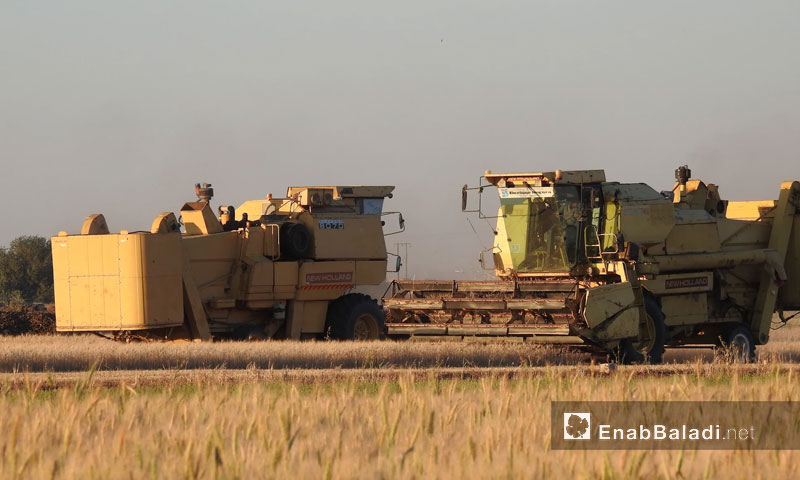



Farmers in Aleppo’s northern countryside are facing a new dilemma, in relation to the deployment and marketing of their crops due to the confusion in the Turkish decisions, which allow them to transport crops through its borders after a number of problems which affected their prices and quality.
Ahmad al-Hassan, one of the areas’ farmers, tells Enab Baladi that the crops which the farmers are having the most difficulties in deploying are Habbat Al-Barakah (the Seed of Blessing) and Coriander.
He explains that each kilogram costs farmers about 700 Syrian pounds; however, they are trying to sell it for 300 Syrian pounds and no one is buying, for the people in the area have already secured their needs of the crop and do not have the ability to store additional amounts.
The harvest is getting worse year after year, according to the farmer, for this year there was no rain, and dozens of farmers died due to mines, in addition to the elaborate displacement, which led to the death of thousands of fruitful trees because farmers were not there to take care of them.
Farmer Abdullah Junaid says that the farmers have expected a better income for the last year’s crops compared to the income of previous years, for they have not made any use of their lands throughout the period in which the “Islamic State” Organization controlled the villages of Aleppo’s northern countryside.
Indeed, this year’s crops were sufficient. Nonetheless, the farmers are still having the crops which they have harvested; they could not sell them due to lacking shipping methods.
At the end of this agricultural year, the Turkish Government has allowed the crops’ entry into its territory, which encouraged many farmers to seed again. However, the Turkish decision lasted for a short period, after which the Turks stopped buying the crops for reasons unknown to the farmers.
The Director of the Local Council in the village of Suran and its countryside, Ali Sheikh, says that the Turkish Government, in the beginning, allowed for the admittance of crops. However, the war merchants started buying massive amounts of seeds, raised their prices and started selling them to the Turks. As a result of this, the prices of the Syrian crops became higher than the Turkish ones, which prompted the government to stop allowing the entry of any corps from Syria.
The council continually seeks to find solutions with the Turks to alleviate the suffering of the farmers who have been exhausted by different conditions, especially that now it is the winter potato harvesting season, which is sold at a rate of 75 Syrian pounds per kilo that is totally less than the real cost that the farmers are paying, for potatoes are irrigation-dependent, which costs extra money.
75% of the people in Aleppo’s northern and eastern countryside fundamentally depend on rainfed and irrigated agriculture which consists their basic, and only, source of income.
Nevertheless, the increasing prices of fuel, fertilizers, and pesticides, in the past a few years, have negatively affected the areas’ agricultural production, in addition to the mines which the “Islamic State” Organization have planted in these lands prior to leaving the area.
if you think the article contain wrong information or you have additional details Send Correction